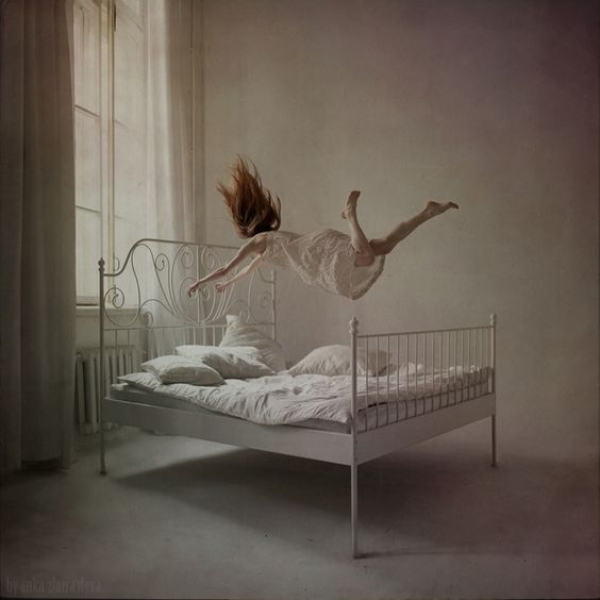Three Ways To Avoid Age-Related Circadian Rhythm Disruption
Dr Christiane Northrup MD
Occasional problems with sleep are common at midlife, often secondary to hot flashes and night sweats, or anxiety and depression—which often occur together in midlife women. Between 20 and 40 percent of women have sleep disorders, and women in perimenopause often need more sleep and suffer from insomnia more often than do men of the same age.
When we don’t get sufficient sleep, we not only become tired and irritable, but we are more accident-prone and exhibit decreased concentration, efficiency, and work motivation. Inadequate sleep can cause errors in judgment. Plus, lack of sleep causes stress hormones to rise, which over time can disrupt hormonal balance and depress the immune system. Too little sleep over time can put you at greater risk for obesity, heart disease, and diabetes.
Sleep is also critical for consolidation of learning and memory, and it serves as a way to help us sort out in our minds and bodies the things we have learned and experienced during the day. In fact, studies have linked a nightly battle with insomnia to memory loss, dementia, and even Alzheimer’s, not to mention other brain disorders, including Parkinson’s.
Why You Can’t Sleep at Midlife
Hot flashes and night sweats are by far the most common reasons for sleep deprivation at midlife. In many women at menopause, the brain chemicals that are important for sleep undergo changes, making our bodies become less efficient at falling into a deep sleep – the sleep that is associated with the release of human growth hormone and memory consolidation, and that is essential for feeling rested in the morning — and more easily aroused by internal or external stimuli.
Your ability to sleep is also profoundly affected by your feelings. At midlife, many women experience increased demands at work and at home. Insomnia and hot flashes are exacerbated by underlying unresolved and unprocessed emotions, such as stress, anxiety, sadness, fear, and anger, and the unfinished business that fuels these symptoms, creating a perfect storm for poor sleep.
9 Natural Sleep Aids for Insomnia
Natural sleep aids can help with occasional midlife sleep problems. But, it’s important to remember that some natural sleep aids bind to the same place in the brain as prescription sleep drugs. And, like prescription drugs, natural sleep aids can lose their effectiveness over time. Be sure to consult your physician before taking any supplements.
2% progesterone cream. Try bioidentical progesterone cream. Use one-quarter to one-half teaspoon at bedtime on skin. Progesterone binds to the GABA receptors in the brain and has a calming effect.
Pueraria mirifica. This herb has been used in Thailand for over 700 years to help women quell perimenopausal symptoms. It’s ability to interact with the body’s own estrogen to help diminish hot flashes makes it excellent for calming the mind and body at night.
Amantilla and Babuna. These natural medicines originate from the valerian plant (Valeriana officinalis) and the flower of the manzanilla plant (Matricaria recutita, commonly known as chamomile), respectively. In a double-blind, randomized, placebo-controlled multicentered study, Amantilla was 82.5 percent effective in helping patients sleep, while Babuna was 68.8 percent effective. On nights when you’re keyed up, try 15 drops of Babuna thirty minutes before going to bed, followed by 15 drops of Amantilla at bedtime.
Valerian. Look for valerian (Valeriana officinalis) in capsule form, as it has a bad taste. The dosage is 150–300 mg of a product standardized to 0.8% valerenic acid. Use one hour before bedtime.
Melatonin. Melatonin is secreted by the brain’s pineal gland in response to cycles of light and darkness. It helps your body regulate its sleep-wake cycles, so it can be good for travel-related insomnia. Natural melatonin secretion is also affected by depression, shift work, and seasonal affective disorder (SAD). The usual dose is 0.5–3.0 mg, taken one hour before bedtime.
5–HTP. 5-HTP (5–hydroxytryptophan) increases serotonin, which is converted to melatonin. This is why 5-HTP may be helpful for sleep pattern disruption, as well as PMS and seasonal affective disorder (SAD). The starting dose is 100 mg, three times per day. Gradually increase over several months to 200 mg, three times per day.
Magnesium. Magnesium deficiency is associated with insomnia. Most people, especially women, have less-than-optimal magnesium levels. If you experience restless sleep or wake up frequently during the night, adding magnesium may help you sleep more soundly.
Magnolia bark. In Traditional Chinese Medicine, magnolia bark is used to promote relaxation and sleep, as well as to ease anxiety and stress by lowering adrenaline. Research shows that magnolia bark can reduce the time it takes you to fall asleep and can increase the amount of time you spend in both REM sleep and NREM sleep. For people with anxiety, magnolia bark can be as effective as the drug diazepam without the risks of dependency or side effects. The standard dosage is around 250 – 500 mg daily with a higher dosage recommended for improving sleep.
L-Theanine. This amino acid found in tea leaves increases the levels of GABA, serotonin, and dopamine – calming neurotransmitters in the brain that regulate emotions, mood, concentration, alertness, sleep, and energy. Increased levels of these chemicals help with sleep, as well as menopause-related mood swings, difficulty concentrating and changes to appetite during menopause.
Be sure to avoid prescription and over-the-counter sleep medications. They are habit-forming and lose their effectiveness over time as the brain builds up a tolerance so that you need more and more to get the same effect. If you do use them, make sure you use it for no longer than 7 to 10 consecutive days. Over-the-counter sleep remedies are troublesome, too, because they interfere with the production of the brain chemical acetylcholine, which is very important for memory. The use of these drugs over time can cause serious memory problems and confusion
15 Ways to Get a Good Night’s Sleep
- Take a good multivitamin/mineral daily.Taking nutritional supplements can contribute greatly to your overall health. When you are in good health, you have a better likelihood of sleeping without disturbances, including those caused by medications and pain. In addition to a multivitamin and mineral supplement, you may want to take an antioxidant supplement daily.
- Avoid alcohol.While you may fall asleep quickly after drinking, alcohol can interrupt your circadian rhythm. Another reason you don’t sleep well when you drink alcohol is because alcohol blocks REM sleep, the most restorative type of sleep, so you wake up feeling groggy. Finally, alcohol reduces anti-diuretic hormone (ADH) so you may have to get up to urinate during the night.
- Limit caffeine. Women metabolize caffeine much more slowly than men. Even one cup of coffee in the morning can affect your sleep quality later if you are sensitive.
- Get regular exercise. Regular exercise can improve the quality and quantity of sleep. Being physically active can make you feel more tired at bedtime. In addition, exercise can reduce stress levels, making it easier to fall and stay asleep. Mind-body exercises such as gentle yoga can help quiet the parasympathetic nervous system, which can help you relax before bed. Just don’t exercise vigorously within three to six hours of bedtime.
- Get a good quality mattress. Be sure your mattress supports you and does not cause any stress on your joints. A good mattress is worth the investment—you spend a third of your life asleep!
- Sleep in a dark room. Excess light in your bedroom – such as the artificial light emitted from streetlights, televisions, or smartphones and other devices – can disrupt your circadian rhythm by suppressing the production of melatonin.
- Follow a low-glycemic diet. High blood sugar and insulin are often associated with poor sleep because they are associated with high cortisol levels at night. When cortisol is high at night, your rapid eye movement (REM) sleep is disrupted. This can leave you feeling unrefreshed, no matter how many hours of sleep you get.
- Don’t eat before bed. There are a number of reasons why eating a large meal before bed isn’t the best idea, including the possibility of weight gain if you do this regularly. In addition, your body digests food better when you are upright. So, lying down to sleep after a heavy meal may cause you to experience heartburn or acid reflux. Since it takes about 3 hours for your stomach to empty after a meal, a good rule of thumb is to stop eating at least 3 hours before bed. However, a light snack (one high in protein and low in refined carbohydrates) is okay and may even help some people sleep better.
- Stop Drinking Water. While you want to be optimally hydrated at all times, drinking a lot of water before bed may cause you to wake up in the middle of the night to go to the bathroom, which causes a big disruption to your sleep cycles. Try to drink (and eat) more water during the day and less late at night. If you do need some water, take small sips rather than big gulps.
- Tidy Up. I’m not suggesting that you clean your entire house top to bottom. But, straightening up, washing the dinner dishes, preparing your kitchen for your morning routine, or putting away your clothes can be great ways to bring your attention to the moment. Plus, having a tidy house can reduce cortisol levels, helping you to feel more relaxed.
- Make a to-do list. If you tend to worry about things you need to do tomorrow while lying in bed, it helps to write them down before going to sleep. You may also want to leave a pen and a piece of paper next to your bed so if you wake up and think of something you forgot, you can jot it down. (You can also write down your dreams.)
- Stay calm. Don’t watch the news (or disturbing movies) before bed—it activates the sympathetic nervous system. For the same reason, try not to have emotionally distressing conversations near bedtime, and try not to stew over things. (If you find you are turning things over and over in your mind, get out of bed and do something else relaxing, such as taking a bath or reading a good book for a while).
- Wind down: Establishing a ritual that helps you wind down before bed can help to signal your mind and body that it’s time for sleep. Change into your PJs and get completely ready for bed at least half an hour before you climb between the sheets.
- Shut off all electronics. The blue light that comes off screens mimics the light of full daylight, which can affect melatonin production and disrupt your sleep patterns. Plus, checking email and social media before bed can cause overthinking and increase stress and worry when you are trying to go to sleep.
- Practice mindfulness. Mindfulness helps to decrease stress levels and increase relaxation, which can help you fall asleep faster and stay asleep. You can practice mindfulness by sitting quietly, stretching, or gently practicing yoga, or reciting affirmations before bed.
3 Ways to Avoid Circadian Rhythm Disruption at Midlife and Beyond
Your circadian rhythm is your 24-hour internal clock. It helps to determine your sleep-wake patterns, as well as physical, mental and behavioral differences throughout the day. You’re your circadian rhythm even affects your metabolism.
As you grow older, your circadian rhythm changes so many people experience a decrease in the length and quality of sleep. This may result in feeling tired and even experiencing cognitive decline later in the day. And studies show that disruption of the circadian rhythm is linked to obesity, mood disorders, cardiovascular disease, and even cancer.
Fortunately, you can overcome age-related circadian rhythm changes with a few simple strategies. Here are 3 ways you can reset your circadian rhythm and keep it on track so you experience better sleep:
- Spend time in nature. The primary external influence on your circadian rhythm is light. Most people have limited light exposure during the day and an increased amount of artificial light during the evening, which can contribute to disruption of your circadian rhythm. Spending more time outdoors can help restore your natural sleep-wake cycle. One good option is to go camping for a few days where you have no (or very little) artificial light. This will help set your body to “solar” time. (Be sure to leave your smart phone turned off completely, unless it’s an urgent matter.) If camping is not an option, you can try going outside more frequently during the day, especially if you feel tired. The sunlight can help your body feel awake and help get you through the rest of the day and evening until it’s time to sleep.
- Change your schedule. Making gradual changes to your sleep schedule over time can help reset your circadian rhythm. For example, if your current pattern is to go to bed at 12 AM, try going to bed 15 or 30 minutes earlier each week. After a month or two you will have reset your sleep clock to go to bed by 10 PM. If you normally wake up at 6 AM, you will be getting fully 8 hours of sleep. You can also change your schedule to go to bed later and waking later by using the same strategy. Also, shifting when you eat by 15-30 minutes (earlier or later) will also help reset your circadian rhythm.
- Try a sleep deprivation challenge. If you’ve even been on an overnight flight and unable to sleep, then stayed up all day once you reached your destination, you have essentially done a sleep deprivation challenge. Sleep deprivation is used in clinical settings as part of chronotherapy and depression treatment. You simply stay up for 24 hours then go to sleep at your regular time the following day. The idea is that depriving yourself of sleep for a day, will help reset your internal clock and overcome sleep problems. However, this is not for everyone. It’s best to work with your healthcare provider. And you should not drive or plan any activities while sleep-deprived.
Remember, persistent sleep problems are often messages from your inner guidance system that something is off balance in your life. You need to address the imbalance directly before you can truly have quality sleep
Are you getting quality sleep? What are some of the things you do when you have trouble sleeping?
For more information check out www.drnorthrup.com




